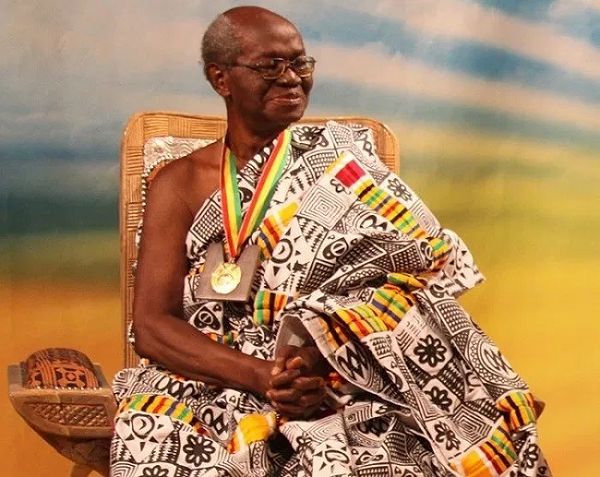
This was the noblest African of them all - Celebrating the treasures of J.H. Kwabena Nketia
A certain CEO once said, “Don’t ever take a job for the money or a title … I will go for a cause anytime versus a job.”
There are people who not only crave but fight for leadership status and exalted titles.
Advertisement
And there are leaders who are truly exalted by the sheer force of who they are as fully fledged human beings. Such people don’t crave leadership per se, but their lives reflect enduring rays of light.
Generous to a fault
Political power, for example, tends to corrupt and the telltale signs are visible, especially in Africa’s leadership; but personal power - the kind natural to the Prof. Nketia types - cleanses one’s very soul.
Prof. Nketia is one of those natural leaders to whom I dedicated a chapter in a book I used to teach leadership seminars. Such people I never tire of writing about.
Their lives and accomplishments make the work easier through the legacy of their own writings. He was a great mentor, nudging my intellect with healthy doses of conscience, selflessness and humility, just as he did for others who came in contact with him.
His daughter recalled: “Our home was like a research centre, with people from all walks of life coming in to see him. Daddy was very generous with his knowledge, spotting potential in others and spending time to nurture and mentor his protégées.”
Ghana’s ambassador of music
When Prof. Nketia came to teach at the University of California, Los Angeles (UCLA), his admirers in California were not destined to love and keep him for long in the Golden State.
For us in the Ghanaian community, no sooner had he got there than, in 1983, the University of Pittsburgh made him an offer he couldn’t refuse: the Andrew W. Mellon Professor of Music. Soon thereafter, he was made Chairman of the Music Department from 1986 to 1989 to add his subtle flavours to the courses in Ethnomusicology.
In June 1988, the China Conservatory of Music, Beijing, invited him to design a six-week course in Ethnomusicology for scholars in music research.
From China, he was in Canberra, Australia, to participate and give a plenary address on “Exploring Intercultural Dimensions of Music in Education”. From 1989 to 1992, Prof. Nketia served in the Overseer’s Committee of Harvard University’s Department of Music.
Prof. Nketia cherished the presentation of a “Festschrift” on him by UCLA (October 21, 1989). Conferred in two volumes titled “African Musicology: Current Trends”, the Festschrift celebrated “the international influence and recognition of one of the world’s premier humanistic scholars, ethnomusicologists and music educators, Prof. J.H. Kwabena Nketia”.
The event confirmed the deep respect in which Prof. Nketia was held worldwide.
In the following month, Harvard honoured him to give the Charles Seeger Memorial Lecture. As Prof. Nketia recalled, “The hall was packed and many people were sitting on the floor.” He described the event as “a sort of crowning thing in my career as an Ethnomusicologist in the United States”.
From Pittsburgh, Prof. Nketia was at Kansas University as Langston Hughes Professor of African and African-American Studies for the Spring of 1992.
His work endures
Visiting him at his office at The School of Performing Arts, University of Ghana, Legon – in about 2000 – he took me around the departments.
He showed me four completed manuscripts, each ready for publication as a complete book and should attract prospective publishers:
• Sound Instruments of Ghana, Vol I. Organology, Performance Practices, and Cultural Contexts.
• Sound Instruments of Ghana, Vol II. Sound Instruments and Cultural policy. (Re-Defining the Boundaries of Tradition).
• AYAN – The Poetry of Atumpan Drums. Vol I. A Study of the Themes, Referential System, and Performance Dynamics.
• AYAN – The Poetry of Atumpan Drums. Vol II. Anthology.
Inasmuch as peculiar intelligences drive gifted learners and great achievers, Prof. Nketia fits the intrapersonal mode. He is reflective and examines perspectives to feel his own way.
He avoids gossip and the mundane, and thinks largely in terms of ideas. He enjoys his private space, and sets goals which he achieves quietly.
Though he tends to be alone, he is hardly lonely. He achieves best through listening, in his case through the poetry in music while composing his own songs and sharing them.
On leaving his office – adorned with awards of all kinds – he gave me a selection of his music into CDs and cassette tapes in (ICAMD-DMV) Vols 1 – 4 as a testimony of his lifelong interest in this creative field. He said, in the companion booklet: “A hunter is the person whose venison lies on the hot grill and not the one whose venison is in the bush.”
The collections were improvisations for symphony and orchestral performances with strings, percussions, piano, flutes and horns, and were digitised by his archival assistant Andrews Agyemfra-Tettey.
Colombia celebrated the enduring legacy
The last time I was with Prof. Nketia was when the Ambassador of Colombia, Claudia Turbay Quintero, requested that I escort and sit with him in a musical event to celebrate his enduring legacy at the Kempinski Hotel Gold Coast (Accra, July 20, 2018).
That memorable event featured international veteran pianist - Sergey Sychkov, French/Colombian bass singer - Hyalmar Mitrotti, and Monica Danilov - a mezzo-soprano singer.
The audience was spell-bound with the singing - in Asante Twi - of Prof. Nketia’s compositions, “Onipa Beyee Bi” and “Monkanfo no”.
I’ve met quite a few people in my life, but sitting at the feet of Prof. Nketia – to source vignettes and teasers from his immense intellect – is one of heaven’s cherished prizes to me. Amen!
Email: [email protected]
Blog: www.anishaffar.org



